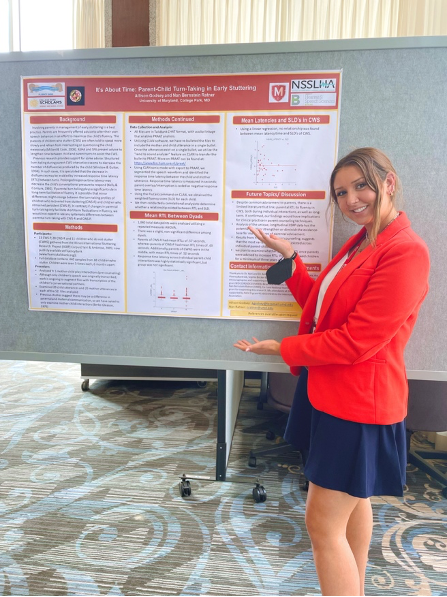MLSC Announces 2022 Language Science Summer Research Fellows
September 26, 2022
Maryland Language Science Center

The Language Science Center awarded two undergraduate research fellowships in summer 2022. These fellowships are funded in part from the generous contributions of donors on Giving Day Allison Godsey is a senior majoring in Hearing & Speech Sciences, who aims to become a speech-language pathologist. Her project, "It's about time: Parent-child turn-taking in early stuttering," looks at whether the way parents talk with their children who stutter has any impact on whether those children recover from stuttering or persist. Although parents are often advised to change their speaking behavior--specifically to speak more slowly and pause longer between turns--there has been little evidence to back up the practice. Allison is analyzing recordings of interactions between parents and children, comparing response latencies (i.e. the pauses between turns) of parents whose children ultimately recovered with those whose children persisted in stuttering. She presented preliminary findings at the Joint World Congress on Stuttering and Cluttering over the summer, and will also have a poster at the annual conference of the American Speech-Language-Hearing Association (ASHA) in November. Sterling Mullenix is a senior majoring in Linguistics, who is considering pursuing a PhD. His project, "Which constraints do we investigate infants with?" is about when and how children learn some of the rules of the grammar of their native language. In English, the sentence "The woman saw the man with the telescope" is ambiguous: it might mean the woman used a telescope to see the man, or that the man she saw was using a telescope. But the question "What did she see the man with?" is not ambiguous: it can only be asking about what she used to see the man. How do children figure that out? The first step to answering questions about language development is usually to determine at what age children converge on the adult grammar: in this case, when they know that the question only has one possible interpretation, not two. Sterling has been testing 3-year-olds on an experiment to find this out, and trying to resolve some discrepancies between in-person and online versions of the experiment. Sterling runs an online version of the experiment for young children. Congrats to Allison and Sterling for their productive summers! The Language Science Center will continue the undergraduate research fellowship program at least through summer 2023, with one fellowship awarded in fall 2022, spring 2023, and summer 2023.



